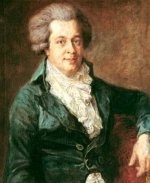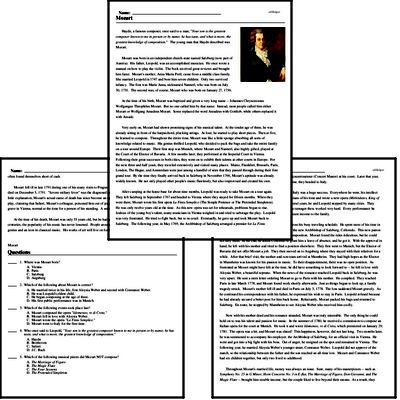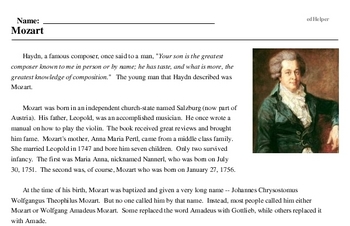Mozart
Mozart
Reading Comprehension for January 27
Haydn, a famous composer, once said to a man, "Your son is the greatest composer known to me in person or by name; he has taste, and what is more, the greatest knowledge of composition." The young man that Haydn described was Mozart.
Mozart was born in an independent church-state named Salzburg (now part of Austria). His father, Leopold, was an accomplished musician. He once wrote a manual on how to play the violin. The book received great reviews and brought him fame. Mozart's mother, Anna Maria Pertl, came from a middle class family. She married Leopold in 1747 and bore him seven children. Only two survived infancy. The first was Maria Anna, nicknamed Nannerl, who was born on July 30, 1751. The second was, of course, Mozart who was born on January 27, 1756.
At the time of his birth, Mozart was baptized and given a very long name -- Johannes Chrysostomus Wolfgangus Theophilus Mozart. But no one called him by that name. Instead, most people called him either Mozart or Wolfgang Amadeus Mozart. Some replaced the word Amadeus with Gottlieb, while others replaced it with Amade.
Very early on, Mozart had shown promising signs of his musical talent. At the tender age of three, he was already sitting in front of the harpsichord, plucking strings. At four, he started to play short pieces. Then at five, he learned to compose. Throughout the entire time, Mozart was like a little sponge absorbing all sorts of knowledge related to music. His genius thrilled Leopold, who decided to pack the bags and take the entire family on a tour around Europe. Their first stop was Munich, where Mozart and Nannerl, also highly gifted, played at the Court of the Elector of Bavaria. A few months later, they performed at the Imperial Court in Vienna. Following their great successes in both cities, they went on to exhibit their talents at other courts in Europe. For the next three and half years, they traveled extensively and visited many places. Mainz, Frankfurt, Brussels, Paris, London, The Hague, and Amsterdam were just among a handful of sites that they passed through during their first grand tour. By the time they finally arrived back in Salzburg in November 1766, Mozart's aptitude was already widely known. He not only played other people's music flawlessly, but also improvised and created his own.
After camping at the home base for about nine months, Leopold was ready to take Mozart on a tour again. They left Salzburg in September 1767 and headed to Vienna where they stayed for fifteen months. When they were there, Mozart wrote his first opera La Finta Semplice (The Simple Pretence or The Pretended Simpleton). He was only twelve years old at the time. As this new opera was set for rehearsals, problems began to rise. Jealous of the young boy's talent, many musicians in Vienna weighed in and tried to sabotage the play. Leopold was very frustrated. He tried to fight back, but to no avail. Eventually, he gave up and took Mozart back to Salzburg. The following year, in May 1769, the Archbishop of Salzburg arranged a premier for La Finta Semplice. He also appointed Mozart an honorary Konzertmeister (Concert Master) at his court. Later that year, Leopold took Mozart on the road yet again. This time, they headed to Italy.




